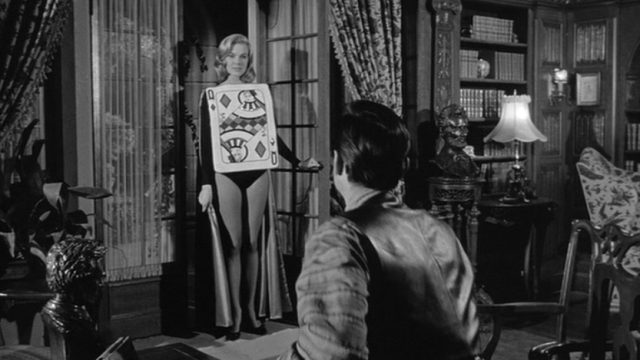Okay, so she first came to my attention because she’s in The Giant Spider Invasion, one of the people from it who turns out to have some really impressive credits. (She’s the slightly Kim Catrall-looking woman who plays the drunk with the awful husband.) I’m not sure any of the others in that movie have quite the same list of credits that she does—she unjustly, in my opinion, had her producer credit taken away on Jonathan Livingston Seagull, even, and she plays the Senator’s daughter in The Manchurian Candidate. My first surprise was discovering that she was still alive; my second was that the most important thing about her is not her acting.
Leslie Parrish was born and initially worked under the name of Marjorie Hellen; she changed her name in 1959 at the request of Li’l Abner director Melvin Frank. She had been a music student when her mother persuaded her to try modeling for a year to earn money; from there, she took up acting to further support her family. You may, in addition to her film work, have seen her on Perry Mason or Star Trek or Batman. She was never quite a star, but she did good, solid work, often in quality shows.
Yet somehow, IMDb has nothing about her more important work. Sure, it talks about how she used to be married to Jonathan Livingston Seagull writer Richard D. Bach and stepmother to his son, Jonathan, a concept artist whose work includes Guardians of the Galaxy Vol. 2. And, you know, that is interesting. But does it mention that she helped develop an early PBS station in LA? Or was one of the campaign managers in Tom Bradley’s first, unsuccessful campaign for mayor of Los Angeles? She tried to pressure Robert Kennedy into running for President, and when she initially failed, she campaigned for Eugene McCarthy instead.
I genuinely do not know where to get started covering her career as an activist. There’s so much of it, and I was unfamiliar with essentially all of it. She was apparently the person who came up with the slogan “suppose they gave a war and no one came,” which was adapted to “what if they gave a war and no one came?” and sold on bumper stickers. She was giving a speech to open Eugene McCarthy’s San Francisco headquarters the night Martin Luther King, Jr., was killed. She helped prevent a valley in Oregon from being logged, producing a scientific report explaining how logging in the area violated federal law.
I do, on the other hand, find myself wondering if she’s kept up with her composing, which was initially what she’d planned to do with her life. She was, before she started modeling and acting, a promising piano and composition student at the Philadelphia Conservatory of Music, and I’d rather like to hear some of what she’s written. I wonder, indeed, if she was talented enough to have worked in the industry as a composer. But then, I suppose she’d have been jsut another working woman in the industry who we hadn’t heard of, and she wouldn’t have had as much influence in politics and government. She may have made the sacrifice for her mother, but she helped more than just her own family.

